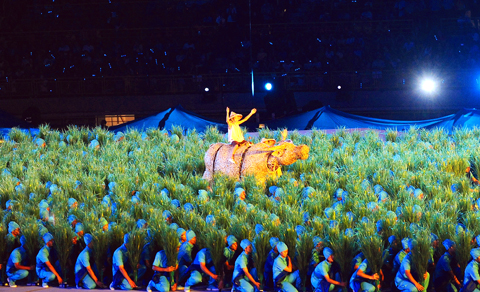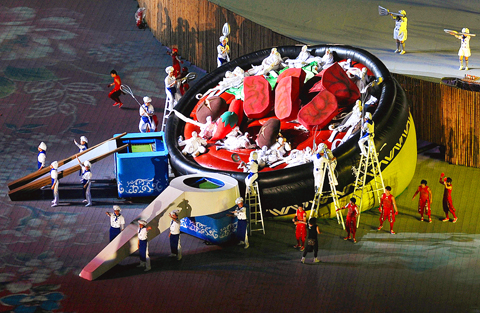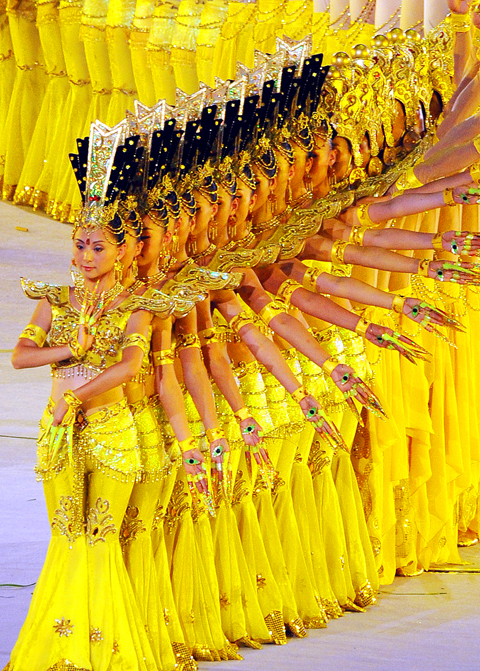The night sky over Taipei was transformed into a kaleidoscope of glistening colors last night as a firework display shimmered and wowed more than 16,000 spectators packed into the new Taipei Municipal Stadium for the opening ceremony of the 21st Deaflympic Games.
The 12-act show was ushered in with three loud bangs as white fireworks shot from the parameter of the stadium. Renowned theater director Stanley Lai (賴聲川) spent two years and a NT$600 million (US$18.3 million) budget to organize the two-hour spectacle.
This is the first Deaflympics to be held in Asia since the competition started in 1924. A record-breaking number — more than 4,000 — athletes and staffers from 91 countries will be competing in 20 events that include soccer, swimming, wrestling, table tennis and orienteering, to be held in Taipei City, Taipei County and Hsinchu County until Sept. 15.

PHOTO: CHANG CHIA-MING, TAIPEI TIMES
An ensemble of 80 hearing impaired drummers from U-Theatre kicked off the evening, followed by an artistic performance entitled The Song of the Ocean and Field, featuring top model Patina Lin (林嘉琦) as the Goddess Matsu, who in sign language bestowed blessings upon the audience and the Games’ participants.
Themed around Taiwan’s landscape and ecology, performers then brought in giant butterflies, lilies and water droplets to symbolize the natural beauty of Taiwan.
The audience burst into applause and cheers when pop diva A-mei (阿妹), of Puyuma origin, flew across in white wings, belting out the Games’ theme song, Dreams.

PHOTO: WANG YI-SUNG, TAIPEI TIMES
To highlight Taipei as the culinary capital of the Chinese speaking world, performers dressed as rice, mushrooms and stewed eggs prepared giant bowls of local delicacies, such as minced pork, rice and beef noodle soup — which the organizers said all the athletes would have a chance to sample at the end of the tournament.
The Games are being held a month after Typhoon Morakot hit the south early last month, killing at least 600 people and completely obliterating several Aboriginal villages. To pay attribute to the victims and relief workers, a short prayer was offered by Chinese martial arts star Jet Li (李連杰), who recited the words with four rescue workers who saved all 137 people in Jiamu Village (佳暮), Pingtung County.
At one point in the show, first lady Chow Mei-ching (周美青) made an appearance in which she appeared on stage, embracing a child while being surrounded by Aboriginal dancers.

PHOTO: WANG YI-SUNG, TAIPEI TIMES
One of the highlights of the evening — the procession of athletes — was led by the team from Algeria. The Chinese delegation, as with the Kaoshiung World Games in July, boycotted the opening ceremony and are also expected to be a no-show for the closing ceremony.
The Chinese national flag was carried by a lone staffer.
The decibels shot through the roof when the 202-member Taiwan delegation entered the arena. The crowd immediately rose to its feet and screamed for the home team, who entered last.
There was a minor incident when the organizers lit up the Games’ logo and a portion of it caught fire. The fire was quickly put out and no one was injured.
Chen Hui-ya (陳慧亞), 23, an accountant working in Taipei, said watching the show made her feel “so proud of my city” and said she hoped all the athletes would go back home and tell wonderful tales of what they had experienced in Taipei.
Major traffic controls were imposed around the stadium to block off non-game related vehicles, and every member of the audience, including the media, had to pass multiple security checkpoints.
The show was attended by many pan-blue politicians, the only opposition present being a small number of independence activists who were handing out literature at the entrances to the stadium.
Meanwhile, Taipei City’s Department of Information and Tourism said yesterday that a total of 14 municipal attractions would offer free admission or discounts to Deaflympics athletes.
Seven of the 14 cultural and recreational attractions in Taipei, including the National History Museum, National Taiwan Science Education Center and Taipei Museum of Contemporary Arts would offer free admission to Deaflympics athletes, guests from the International Committee of Sports for the Deaf and Games volunteers, the department said.
Other locations, including the National Palace Museum, Chiang Kai-shek Memorial Hall, Taipei 228 Memorial Hall and Taipei Fine Arts Museum would offer discounts, it said.
Athletes or guests will just need to show their Deaflympics pass.
ADDITIONAL REPORTING BY MO YAN-CHIH
Also See: Willis, Evans fire Brits to victory
Also See: Volunteering for Deaflympics shows Taiwanese altruism

The US government has signed defense cooperation agreements with Japan and the Philippines to boost the deterrence capabilities of countries in the first island chain, a report by the National Security Bureau (NSB) showed. The main countries on the first island chain include the two nations and Taiwan. The bureau is to present the report at a meeting of the legislature’s Foreign Affairs and National Defense Committee tomorrow. The US military has deployed Typhon missile systems to Japan’s Yamaguchi Prefecture and Zambales province in the Philippines during their joint military exercises. It has also installed NMESIS anti-ship systems in Japan’s Okinawa

‘WIN-WIN’: The Philippines, and central and eastern European countries are important potential drone cooperation partners, Minister of Foreign Affairs Lin Chia-lung said Minister of Foreign Affairs Lin Chia-lung (林佳龍) in an interview published yesterday confirmed that there are joint ventures between Taiwan and Poland in the drone industry. Lin made the remark in an exclusive interview with the Chinese-language Liberty Times (the Taipei Times’ sister paper). The government-backed Taiwan Excellence Drone International Business Opportunities Alliance and the Polish Chamber of Unmanned Systems on Wednesday last week signed a memorandum of understanding in Poland to develop a “non-China” supply chain for drones and work together on key technologies. Asked if Taiwan prioritized Poland among central and eastern European countries in drone collaboration, Lin

Renewed border fighting between Thailand and Cambodia showed no signs of abating yesterday, leaving hundreds of thousands of displaced people in both countries living in strained conditions as more flooded into temporary shelters. Reporters on the Thai side of the border heard sounds of outgoing, indirect fire yesterday. About 400,000 people have been evacuated from affected areas in Thailand and about 700 schools closed while fighting was ongoing in four border provinces, said Thai Rear Admiral Surasant Kongsiri, a spokesman for the military. Cambodia evacuated more than 127,000 villagers and closed hundreds of schools, the Thai Ministry of Defense said. Thailand’s military announced that

CABINET APPROVAL: People seeking assisted reproduction must be assessed to determine whether they would be adequate parents, the planned changes say Proposed amendments to the Assisted Reproduction Act (人工生殖法) advanced yesterday by the Executive Yuan would grant married lesbian couples and single women access to legal assisted reproductive services. The proposed revisions are “based on the fundamental principle of respecting women’s reproductive autonomy,” Cabinet spokesperson Michelle Lee (李慧芝) quoted Vice Premier Cheng Li-chiun (鄭麗君), who presided over a Cabinet meeting earlier yesterday, as saying at the briefing. The draft amendment would be submitted to the legislature for review. The Ministry of Health and Welfare, which proposed the amendments, said that experts on children’s rights, gender equality, law and medicine attended cross-disciplinary meetings, adding that